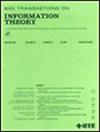Weakly Private Information Retrieval From Heterogeneously Trusted Servers
IF 2.9
3区 计算机科学
Q3 COMPUTER SCIENCE, INFORMATION SYSTEMS
引用次数: 0
Abstract
We study the problem of weakly private information retrieval (PIR) when there is heterogeneity in servers’ trustworthiness under the maximal leakage (Max-L) metric and mutual information (MI) metric. A user wishes to retrieve a desired message from N non-colluding servers efficiently, such that the identity of the desired message is not leaked in a significant manner; however, some servers can be more trustworthy than others. We propose a code construction for this setting and optimize the probability distribution for this construction. For the Max-L metric, it is shown that the optimal probability allocation for the proposed scheme essentially separates the delivery patterns into two parts: a completely private part that has the same download overhead as the capacity-achieving PIR code, and a non-private part that allows complete privacy leakage but has no download overhead by downloading only from the most trustful server. The optimal solution is established through a sophisticated analysis of the underlying convex optimization problem and a reduction between the homogeneous setting and the heterogeneous setting. For the MI metric, the homogeneous case is studied first for which the code can be optimized with an explicit probability assignment, while a closed-form solution becomes intractable for the heterogeneous case. Numerical results are provided for both cases to corroborate the theoretical analysis.从异构可信服务器中弱私有信息检索
研究了在最大泄漏度量(Max-L)和互信息度量(MI)下服务器可信度存在异质性的弱私有信息检索问题。用户希望有效地从N个非串通服务器检索所需消息,这样所需消息的身份不会以重大方式泄露;然而,有些服务器可能比其他服务器更值得信赖。我们提出了这种设置的代码结构,并优化了该结构的概率分布。对于Max-L度量,表明所提出方案的最优概率分配本质上将交付模式分为两部分:完全私有部分,具有与实现容量的PIR代码相同的下载开销;非私有部分,允许完全隐私泄露,但仅从最信任的服务器下载,没有下载开销。通过对底层凸优化问题的复杂分析,并在同质设置和异质设置之间进行约简,建立了最优解。对于MI度量,首先研究了齐次情况下代码可以通过显式概率分配进行优化,而对于异构情况,代码的封闭解变得难以求解。数值结果证实了理论分析的正确性。
本文章由计算机程序翻译,如有差异,请以英文原文为准。
求助全文
约1分钟内获得全文
求助全文
来源期刊

IEEE Transactions on Information Theory
工程技术-工程:电子与电气
CiteScore
5.70
自引率
20.00%
发文量
514
审稿时长
12 months
期刊介绍:
The IEEE Transactions on Information Theory is a journal that publishes theoretical and experimental papers concerned with the transmission, processing, and utilization of information. The boundaries of acceptable subject matter are intentionally not sharply delimited. Rather, it is hoped that as the focus of research activity changes, a flexible policy will permit this Transactions to follow suit. Current appropriate topics are best reflected by recent Tables of Contents; they are summarized in the titles of editorial areas that appear on the inside front cover.
 求助内容:
求助内容: 应助结果提醒方式:
应助结果提醒方式:


